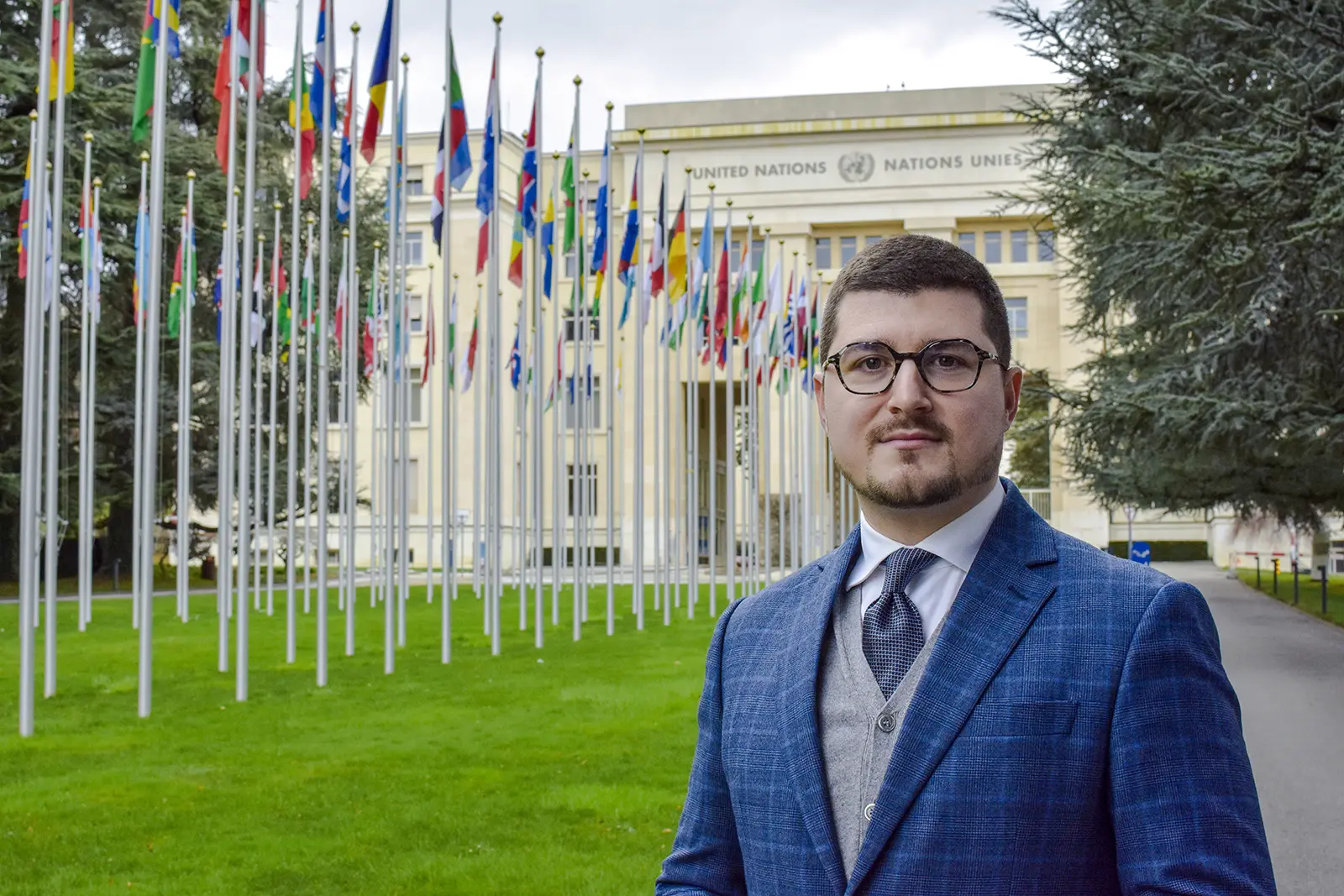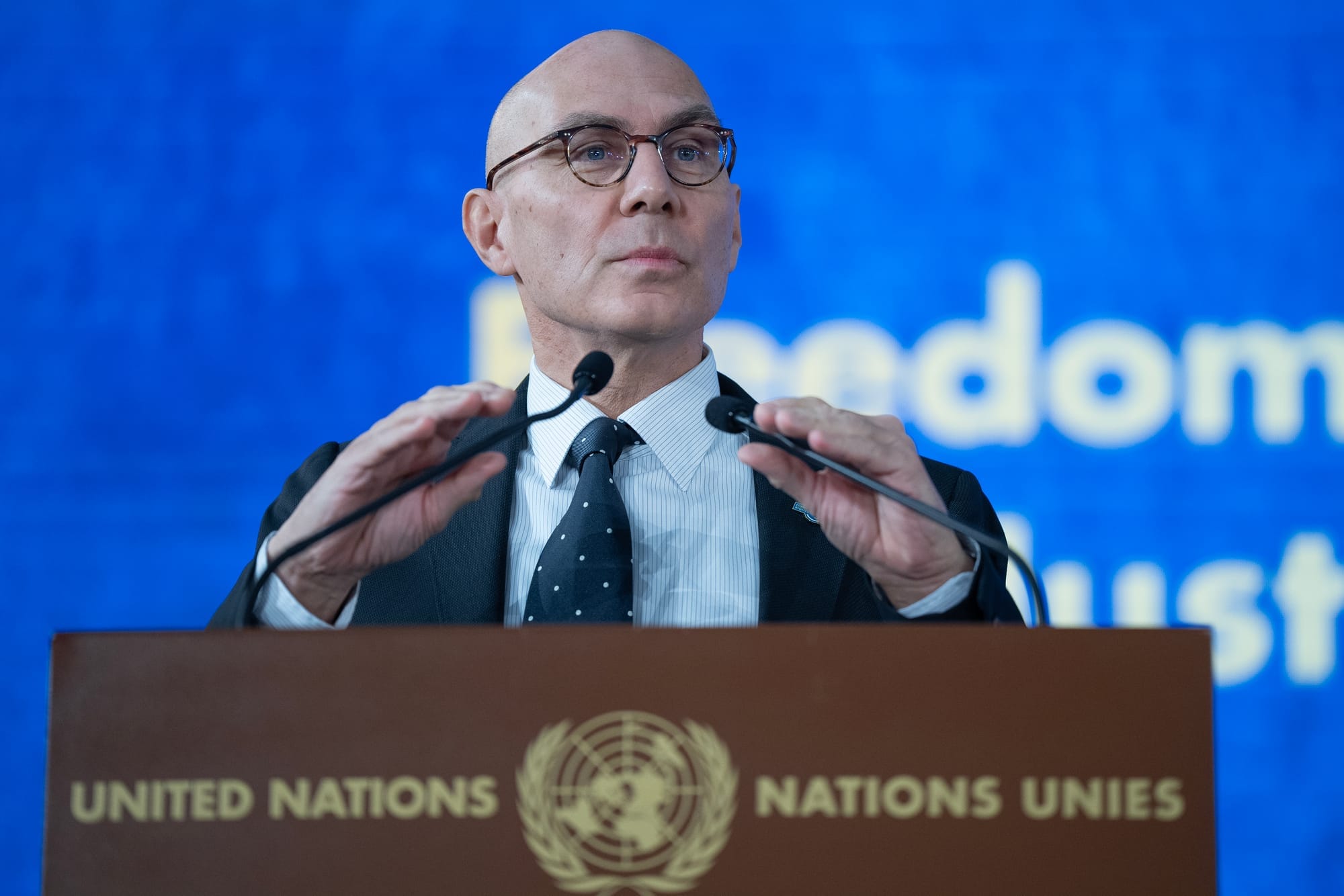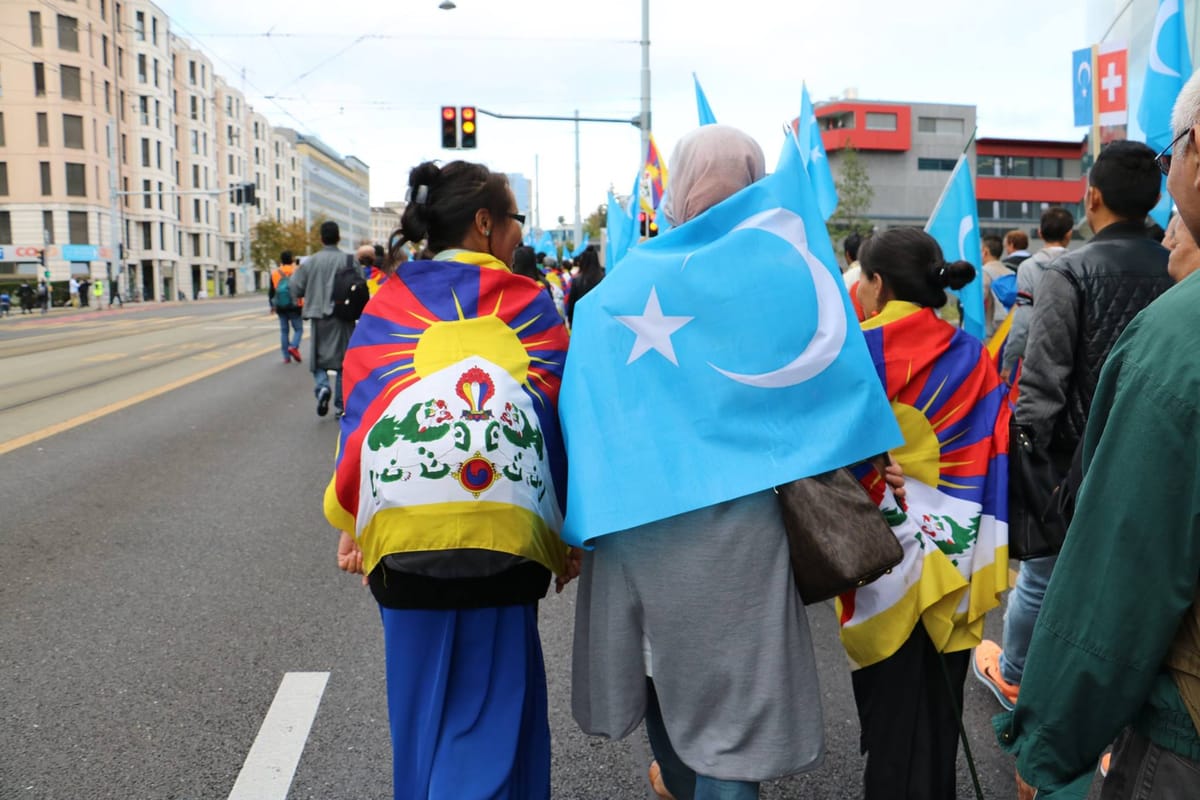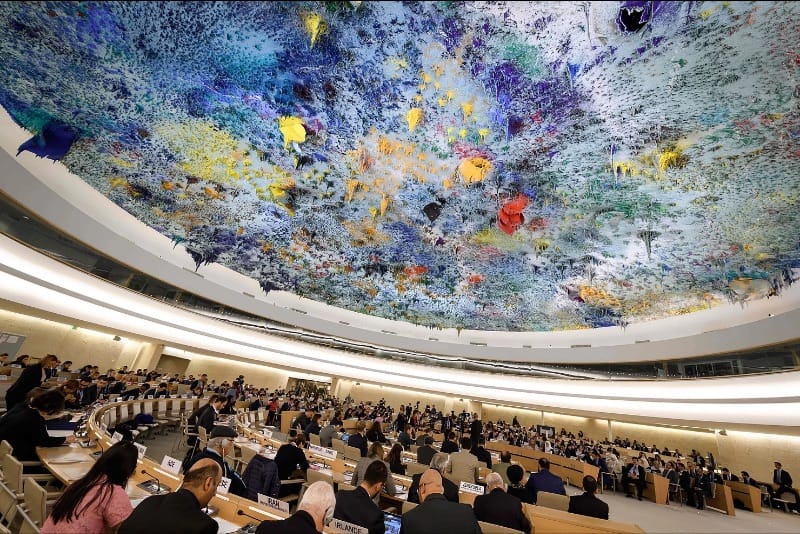
#174 THE G|O BRIEFING, MARCH 21, 2024
Fake News and Massive Disinformation Campaign Target WHO | NGOs Concerned About UN Rights Chief's Soft Public Stance on China | Op-Ed: Rift Grows Between US and Israel, but Significant Separation is Needed
Today in The Geneva Observer:
We report on a massive fake news and disinformation campaign against an international pandemic agreement being negotiated at the World Health Organization (WHO), as governments scramble to meet a May 24 deadline.
Stephanie Nebehay has a piece on the growing frustration of some NGOs with UN human rights chief Volker Türk’s reluctance to publicly confront China.
And Daniel Warner has an opinion piece on the deepening rift between the United States and Israel.
US Religious Far-Right, Conspiracy Theorists, and Populists Use Fake News and Disinformation to Assail WHO’S Pandemic Treaty
For the last two years, an organized, well-financed, and influential coalition of conspiracy theorists, far-right US religious organizations, nationalist leaders, and detractors of the multilateral system in the US and Europe have been waging a sustained disinformation campaign against the ‘pandemic treaty’, an international agreement currently being negotiated by the World Health Organization’s 194 members. The Geneva branch of Alliance Defending Freedom (ADF), defined as a “hate group” by a highly respected US NGO, is active in the campaign. This disinformation campaign has reached such a level that WHO is now worried that the campaign could undermine the efforts to reach an agreement.
Last year, former Republican Congresswoman Michele Bachmann alleged that the Biden administration was “bringing amendments [to the treaty] that would propose that all nations of the Earth cede their sovereignty over national health care decisions to the WHO,” in comments made while appearing on the ‘War Room’ Podcast hosted by Steve Bannon, Donald Trump’s former far-right consigliere.
The line was repeated and amplified a few days later on Fox News by US TV host Tucker Carlson: “The Biden administration,” Carlson professed, “is very close to handing the World Health Organization power over every aspect, the intimate aspects, of your life. So, imagine the civil liberties abuses that you lived through the COVID lockdowns, but permanent, and administered from a foreign country,” he said, ominously.
An Instagram post by ultraconservative site The Epoch Times falsely claimed that these powers “would include vaccine policies, lockdown policies, school closure policies, the contact tracing of US citizens, and even the monitoring of online speech if that speech goes against the official narrative.”
They will instead become the ones to actually determine which policies we implement, like our vaccine policies, our lockdown policies, and even the monitoring of our online speech if that speech goes against the official narrative.https://t.co/EzXDi0oxGw
— The Epoch Times (@EpochTimes) March 10, 2024
But two years on, the disinformation campaign has not stopped—quite the opposite. As the pandemic agreement is hotly debated in Geneva, with a May deadline for completion, the campaign has, in fact, gained new strength and stridency. It has reached such a level that WHO is now concerned that the campaign is hindering the ongoing negotiations and making it even more difficult for the organization’s Member States to meet a self-imposed May 24 deadline to reach an agreement.
“The rhythm of the negotiations” had been affected by “a torrent of fake news, lies, and conspiracy theories,” the World Health Organization’s Director-General Tedros Adhanom Ghebreyesus said earlier this month. It’s an assessment shared by Ashley Bloomfield, New Zealand co-chair of the International Health Regulations parallel negotiations, who has spoken of “a coordinated and sophisticated campaign” of disinformation to try to undermine negotiations.
On February 6, for instance, Chris Smith, a conservative, pro-life, republican member of the US Congress, organized a press conference attacking WHO and the pandemic agreement, again falsely claiming that the pandemic agreement would infringe on national health legislation. The press conference, Smith announces on his website, highlighted “a slew of significant issues surrounding the proposed treaty—including lack of transparency, the backroom negotiations, WHO overreach and infringement on US sovereignty, […] threats to intellectual property rights and free speech, funding for abortion, and how the treaty will benefit China at the expense of the United States.”
“Throughout the COVID-19 Pandemic, the WHO caved to the Chinese Communist Party rather than following the science,” another US republican Congressman said during the event. “Now, the WHO wants to infringe upon our national sovereignty with their proposed ‘pandemic treaty’.”
Also taking part in the conference was Andrew Bremberg, US Ambassador to Geneva under Donald Trump, and a key architect of the anti-abortion Geneva Consensus Declaration. “There is no provision in this treaty that any supporter can point to that you can say if this provision had been in effect in 2019 it would have in any way made a substantive difference in preventing the spread of the COVID-19 pandemic,” he said.
Widely disseminated over social media, these bogus claims prompted the US Department of Health and Human Services to issue a formal statement on February 24: “It is false to claim that the World Health Organization has now, or will have by virtue of these activities, any authority to direct US health policy or national health emergency response actions. The WHO has no such enforcement mechanisms, and its non-binding recommendations to member states are just that: non-binding. Any associated actions at the national level will remain reserved to sovereign states, including the United States.”
Geneva-based diplomats and WHO insiders told The G|O that the negotiations have slowed down as political leaders assess how the campaign is performing in their respective countries.
The concern is such that former British Prime Minister Gordon Brown, WHO’s Ambassador for Global Health Funding, has issued a press release calling on the organization’s Member States to react by exposing the “fake news” campaign by “conspiracy theorists trying to torpedo the international agreement for Pandemic Accord.”
“Among the falsehoods circulating are allegations that the WHO will take away the national sovereignty of countries; that it wants the power to forcibly vaccinate people; intends surveillance of people’s movements through digital passports; and that under the accord, will have the ability to deploy a global police force of armed troops to enforce mandatory vaccinations and lockdowns,” Brown said. “All of these claims are wholly false, and governments must work to disavow them with clear facts. No country will cede any sovereignty, and no country will see their national laws set aside,” he stressed. A strong reaction against the disinformation campaign, Brown argues, “will be a test of our ability as a global community to resist the fragmentation of our world and instead cooperate on global problems that need global solutions.”
With the claim of the loss of national sovereignty now thoroughly debunked by reputable fact-checking organizations, opponents of the agreement are shifting their tactics and claiming that such an agreement may impose restrictions on freedom of expression. The move is seen by WHO watchers as an attempt to prevent governments or international organizations from countering disinformation campaigns and fake news during a pandemic or a severe health emergency. “What they mean by freedom of expression is the freedom to disseminate disinformation,” one diplomat told The G|O.
In Geneva, ADF International is also reinforcing the claims that the treaty may impose restrictions on freedom of expression. In a February 2024 statement, the ultraconservative group claims WHO draft text currently under consideration “would commit states to combat[ing] things such as misleading information, misinformation, or disinformation, without offering a definition for these terms or specifying how this would be done.”

“The current draft of the WHO Pandemic Agreement implies that people must be protected from ‘information’ that could subjectively be labeled ‘misleading’ or simply considered ‘too much’ by authorities,” argues Giorgio Mazzoli, Director of UN Advocacy at ADF International.
-JC,PHM

UN RIGHTS CHIEF SPEAKS OUT ON HONG KONG, BUT 'QUIET DIPLOMACY' ON CHINA STULL FRUSTRATES NGOs
UN High Commissioner for Human Rights Volker Türk this week denounced Hong Kong’s new national security law—the first time in a year that he has issued a public statement specifically on China. The move was welcomed by activists, who only regretted that it hadn’t come sooner in an effort to head off the law’s harsh provisions.
Campaigners increasingly question the effectiveness of Türk’s so-called ‘quiet diplomacy’ with Beijing, whose mission in Geneva deploys more than a dozen diplomats working to blunt any criticism of its human rights record in UN forums, they said.


While China has opened up some diplomatic dialogue on economic, social and cultural rights—often a mantra on its agenda—it has not seriously engaged on cases of jailed government critics and the draconian laws used to prosecute them, they add.
“Dialogue is not leading to meaningful action by the Chinese government to address substantiated human rights concerns,” Sarah Brooks, director for China at Amnesty International, told The Geneva Observer. “We would like to see a much more sustained public diplomacy effort to raise concerns about China.”
The vaguely-worded Hong Kong law, due to come into force on Saturday, introduces new categories of crimes, from treason to ‘external interference,’ increasing the risk of activists and others being targeted, Türk said in a statement issued on Tuesday, hours after Hong Kong’s Legislative Council unanimously adopted it. “This ambiguity is deeply troubling, given its potential misuse and arbitrary application, including to target dissenting voices, journalists, researchers, civil society actors and human rights defenders,” he said.
Brooks described Türk’s statement as “a very clear and honest response to the law which was adopted,” but added, “We would like to think that had the statement come out earlier upon review of the document, it may have tempered some of the worst elements of the law.”
Raphael Viana David, China expert at the Geneva-based International Service for Human Rights (ISHR), noted that it was Türk’s first media statement linked to Beijing since last April, when he voiced concern about the sentencing of prominent Chinese lawyers Ding Jiaxi and Xu Zhiyong to 12 and 14 years, respectively, for subversion, following closed-door trials.
Quiet Diplomacy
Viana David said that there was “an unavoidable period of testing strategy” on China for any new High Commissioner, but that “overconfidence in quiet diplomacy” had its limits. “It’s a card the government plays well,” he said. “We’re having increasing doubts about [its] impact, effectiveness, and [the lack of] transparency about the achievements [Türk] is obtaining with it,” he said.
Türk inherited a damning report on China’s repression of the Muslim minority in Xinjiang, issued by his predecessor Michelle Bachelet minutes before she left office on Aug 31, 2022, but he has little to show for his engagement with China to clarify the fate of some 1 million Uyghurs held in camps over the last six years.
The report, based on 40 interviews, including with former Uyghur detainees, documents torture and sexual violence during mass internment. It said that severe restrictions and deprivation continue to be imposed which “may constitute international crimes, including crimes against humanity.”
Türk has not used the phrase ‘crimes against humanity’ in his speeches to the Council, nor did it appear in a UN compilation document that was prepared for China’s UPR in January. In his latest annual global update on March 4 he told the forum that his office continued its dialogue with China in areas including “counterterrorism polices,” minority protection and civil space.
He urged China to “implement the recommendations made by my Office” and to release human rights defenders, lawyers and others detained under criminal legislation that includes the vague offence of “picking quarrels and making trouble.”
Xinjiang Camps
Dolkun Isa, president of the exiled World Uyghur Congress, attended the documentary “All Static and Noise” at the FIFDH film festival last weekend. It shows rare footage of the camps themselves and interviews with several camp survivors describing having been shackled and beaten, as well as appeals from distraught relatives of current detainees accused by Beijing of promoting ‘separatism’ in Xinjiang.
“My mother died in a concentration camp, my two brothers are in concentration camps. […] We have had no news since 2017,” he told the audience. “We are doing advocacy. A documentary is more effective than 100 people speaking. It is an amazing job, thank you on behalf of the Uyghur people.”
Jewher Tohti, daughter of scholar Ilham Tohti who was given a life sentence in 2014, features in the film that shows the detention camps—or what Beijing calls ‘training centres.’ “The Chinese government said recently that they had all graduated—where are they?” she says in the film.
“We are hoping that we can [arrange] a visit this summer because of our advocacy work,” she said of her father, whose whereabouts are unknown. “We hope that what they told us is true and that he is alive, that is my biggest hope.” Tohti joined the FIFDH panel via video link from the United States.
American filmmaker David Novack, who attended his film’s screening in Geneva, said that it had taken great courage for Uyghurs and Kazaks to share their stories, adding: “It always comes with a risk.” “As a Jew from a family in Eastern Europe who lived in concentration camps, I felt extremely compelled to tell the [Uyghur] story so people can begin to understand the scenario. It is a crisis,” he said.
-SN
The Rift between the United States and Israel Is Still a Simple Family Feud; a Significant Separation Is Urgently Needed
US President Joseph Biden and Israeli Prime Minister Benjamin Netanyahu have been personally and politically close for decades, while the United States and Israel have been more than political allies since Israel’s founding in 1948. But a recent speech critical of Netanyahu and Israel’s policies by Charles Schumer, the Democrat Senate Majority Leader—and the highest elected Jewish official in the US—is part of an evolving tension between Biden and Netanyahu, as well as the United States and Israel more broadly, concerning Israel’s policies in Gaza and the West Bank. But if relations between individuals are like relations between states, we are witnessing a simple family feud, when a significant personal and political separation between the two individuals and countries is needed.
Biden has known Netanyahu for 50 years. Their bro-hug during Biden’s tenth official visit to Israel in October 2023 symbolized their close relationship. Biden even admitted once signing a photo for Netanyahu with the words, “Bibi, I love you.” In times of crisis, the pair have been known to telephone each other several times a day. Soon after October 7, however, their familial-like relationship turned frosty. A rift has emerged between them personally and diplomatically over Netanyahu’s overly aggressive reaction to the Hamas attack. Their March 18 phone call was their first since February 15.
Hope that the call would produce radical change was quickly quashed. US National Security Adviser Jake Sullivan described the latest call as “businesslike,” adding that it “did not end abruptly.” No doors were slammed; no one said, “I’ll never speak to you again.” Nor, however, did anyone say, “Let’s agree on a new strategy.”
Within the status quo, the evolving rift increased between the February and March phone calls when Charles Schumer, the Democrat Senate Majority Leader, called for regime change in Israel on the Senate floor, on March 14. For the first time, a US official had publicly challenged the unwavering US support for Netanyahu’s leadership. “It’s impossible to understate the seismic event this was,” observed the chief executive of the Republican Jewish Coalition.
Schumer’s speech was the most public demonstration of the Biden-Netanyahu and US-Israel rift. “The Netanyahu coalition no longer fits the needs of Israel after Oct. 7,” Schumer said. “The world has changed—radically—since then, and the Israeli people are being stifled right now by a governing vision that is stuck in the past.” Schumer proposed that the US could play “a more active role in shaping Israeli policy by using our leverage to change the present course.”
The New York senator’s speech was noteworthy in its criticism, and in coming from the highest-elected Jewish official in American history. It certainly raised the level of tension. End of bro-hug and “I love you”? A significant distancing from an uncritical family relationship between the two countries and leaders? A move away from just a family feud to a real separation?
The first question to ask is, did President Biden know about the speech in advance and did his entourage agree to it? New York Times insiders David Sanger and Peter Baker reported: “There is no indication that the White House was involved in any way in planning the speech.”
If Schumer was not officially delivering Administration policy, what of President Biden’s reaction? “I’m not going to elaborate on the speech,” Biden replied in response to a journalist’s question, adding, however: “He made a good speech, and I think he expressed a serious concern shared not only by him but by many Americans.”
Mere familial “serious concern” about a close relative’s bad behavior or enough “serious concern” to warrant punishment and distancing? The speech received considerable commentary as the strongest public criticism, to date, of the Netanyahu government’s policies by a US official, but what does it mean in practice? There have been plenty of warnings to Netanyahu from Biden officials, but despite repeated warnings from the US about Israel’s disregard for civilians, as well as its outright violations of humanitarian law, Israel’s policies have not changed.
The US President himself was even overheard saying that he and the Israeli leader would need to have a “come to Jesus” meeting—a meeting that has not yet taken place. Beyond threats, what kind of punishment or separation would Biden threaten—or carry out—in such a meeting? Is the misbehaving Netanyahu to have his pocket money ($3.8 billion a year) reduced, or to be denied access to military material? “The United States has quietly approved and delivered more than 100 separate foreign military sales to Israel since the Gaza war began Oct. 7,” The Washington Post reported.
“We should not be forced into a position of unequivocally supporting the actions of an Israeli government that includes bigots who reject the idea of a Palestinian state,” Schumer said. The US “forced” by Israel? The relationship between the two countries is an asymmetrical one by any measure; however, as an eminent international relations specialist suggested to me, it seems as though the United States has almost become Israel’s proxy, instead of the other way around.
Will Schumer’s call for the US to play “a more active role in shaping Israeli policy by using our leverage to change the present course,” be followed? If not, what do financial and military leverage mean? As the former Israeli defense minister Moshe Dayan is reported to have said: “We take the money, we take the arms, and we decline the advice.”
Here is a recent example of the inverted power relationship: “Benjamin Netanyahu Rebuffs US and Readies Rafah Invasion Plan,” The New York Times put on its March 20 front page. “The Israeli leader brushed aside President Biden’s opposition to a planned ground invasion of the city in Gaza, saying that his government would press ahead,” the story continued.
While Gazans suffer inhumane conditions and West Bank settlers continue to terrorize Arabs, Israel and the United States are locked in a simple family feud. Even after Schumer’s speech, no radical separation between the United States and Israel has taken place. As Aaron David Miller wrote in The New York Times: “Make no mistake about it. ‘I’m unhappy with Israel but won’t do much about it’ is Mr. Biden’s policy—driven by the president’s pro-Israel sensibilities, politics, and policy choices he faces in dealing with the current war.”
Schumer’s speech was a rebuke to Netanyahu in a catastrophic situation. Despite the urgency of Gazans’ suffering, Netanyahu continues to “rebuff” US rebukes. As Israel continues killing civilians, destroying buildings and hospitals, cutting off food, water, and shelter for Gazans, much more than rebukes are needed.
Optimistically, the rift is moving towards separation. Bibi’s talk to Senate Republicans was more than a rebuff to Biden. Secretary of State Antony Blinken’s recent announcement that the Biden administration is circulating a draft resolution at the UN Security Council calling for an “immediate ceasefire linked to the release of hostages” is a major reversal of US policy and an important step towards separation.
Meanwhile, the horrendous conditions in Gaza and the West Bank are only getting worse. Due to the lack of separation between the two countries and their leaders, the US is more and more complicit in Israel’s outrageous behavior. Furthermore, without significant separation, Biden and the United States will lose any moral authority they have left—and Biden may lose his leadership position as well.
-DW
Today's Briefing: Philippe Mottaz - Jamil Chade - Stephanie Nebehay
Op-Ed: Daniel Warner
Editorial assistance: David Jenny
Edited by: Dan Wheeler
©The Geneva Observer 2024





